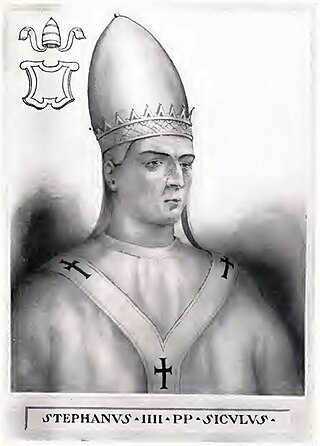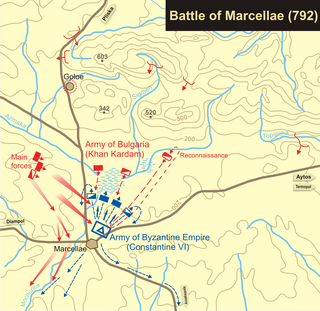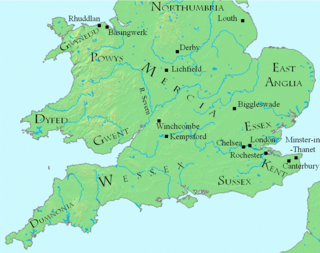The 800s decade ran from January 1, 800, to December 31, 809.
Year 800 (DCCC) was a leap year starting on Wednesday of the Julian calendar, the 800th year of the Common Era (CE) and Anno Domini (AD) designations, the 800th year of the 1st millennium, the 100th and last year of the 8th century, and the 1st year of the 800s decade. It was around this time that the Anno Domini calendar era became the prevalent method in Europe for naming years, so from this time on, the years began to be known as 800 and onwards.
The 790s decade ran from January 1, 790, to December 31, 799.
The 780s decade ran from January 1, 780, to December 31, 789.
The 760s decade ran from January 1, 760, to December 31, 769.

Year 816 (DCCCXVI) was a leap year starting on Tuesday of the Julian calendar, the 816th year of the Common Era (CE) and Anno Domini (AD) designations, the 816th year of the 1st millennium, the 16th year of the 9th century, and the 7th year of the 810s decade.

Year 754 (DCCLIV) was a common year starting on Tuesday of the Julian calendar, the 754th year of the Common Era (CE) and Anno Domini (AD) designations, the 754th year of the 1st millennium, the 54th year of the 8th century, and the 5th year of the 750s decade. The denomination 754 for this year has been used since the early medieval period, when the Anno Domini calendar era became the prevalent method in Europe for naming years.

Year 787 (DCCLXXXVII) was a common year starting on Monday of the Julian calendar. The denomination 787 for this year has been used since the early medieval period, when the Anno Domini calendar era became the prevalent method in Europe for naming years.

Year 774 (DCCLXXIV) was a common year starting on Saturday of the Julian calendar. The denomination 774 for this year has been used since the early medieval period, when the Anno Domini calendar era became the prevalent method in Europe for naming years.

Year 778 (DCCLXXVIII) was a common year starting on Thursday of the Julian calendar, the 778th year of the Common Era (CE) and Anno Domini (AD) designations, the 778th year of the 1st millennium, the 78th year of the 8th century, and the 9th year of the 770s decade. The denomination 778 for this year has been used since the early medieval period, when the Anno Domini calendar era became the prevalent method in Europe for naming years.

Year 780 (DCCLXXX) was a leap year starting on Saturday of the Julian calendar, the 780th year of the Common Era (CE) and Anno Domini (AD) designations, the 780th year of the 1st millennium, the 80th year of the 8th century, and the 1st year of the 780s decade. The denomination 780 for this year has been used since the early medieval period, when the Anno Domini calendar era became the prevalent method in Europe for naming years.

Year 782 (DCCLXXXII) was a common year starting on Tuesday of the Julian calendar, the 782nd year of the Common Era (CE) and Anno Domini (AD) designations, the 782nd year of the 1st millennium, the 82nd year of the 8th century, and the 3rd year of the 780s decade. The denomination 782 for this year has been used since the early medieval period, when the Anno Domini calendar era became the prevalent method in Europe for naming years.

Year 792 (DCCXCII) was a leap year starting on Sunday of the Julian calendar, the 792nd year of the Common Era (CE) and Anno Domini (AD) designations, the 792nd year of the 1st millennium, the 92nd year of the 8th century, and the 3rd year of the 790s decade. The denomination 792 for this year has been used since the early medieval period, when the Anno Domini calendar era became the prevalent method in Europe for naming years.

Year 796 (DCCXCVI) was a leap year starting on Friday of the Julian calendar, the 796th year of the Common Era (CE) and Anno Domini (AD) designations, the 796th year of the 1st millennium, the 96th year of the 8th century, and the 7th year of the 790s decade. The denomination 796 for this year has been used since the early medieval period, when the Anno Domini calendar era became the prevalent method in Europe for naming years.

Year 797 (DCCXCVII) was a common year starting on Sunday of the Julian calendar. The denomination 797 for this year has been used since the early medieval period, when the Anno Domini calendar era became the prevalent method in Europe for naming years.

Year 798 (DCCXCVIII) was a common year starting on Monday of the Julian calendar, the 798th year of the Common Era (CE) and Anno Domini (AD) designations, the 798th year of the 1st millennium, the 98th year of the 8th century, and the 9th year of the 790s decade. The denomination 798 for this year has been used since the early medieval period, when the Anno Domini calendar era became the prevalent method in Europe for naming years.

Year 799 (DCCXCIX) was a common year starting on Tuesday of the Julian calendar. The denomination 799 for this year has been used since the early medieval period, when the Anno Domini calendar era became the prevalent method in Europe for naming years.

Irene of Athens, surname Sarantapechaena, was Byzantine empress consort to Emperor Leo IV from 775 to 780, regent during the childhood of their son Constantine VI from 780 until 790, co-ruler from 792 until 797, and finally empress regnant and sole ruler of the Eastern Roman Empire from 797 to 802. A member of the politically prominent Sarantapechos family, she was selected as Leo IV's bride for unknown reasons in 768. Even though her husband was an iconoclast, she harbored iconophile sympathies. During her rule as regent, she called the Second Council of Nicaea in 787, which condemned iconoclasm as heretical and brought an end to the first iconoclast period (730–787). During her 5 year sole reign, her public figure was polarizing, due to the setbacks faced by the Empire and her iconophilic stances, often attributed to her gender and the influence of her retinue. Her reign as sole ruler made her the first ever empress regnant, ruling in her own right, in Roman and Byzantine imperial history.

Constantine VI, sometimes called the Blind, was Byzantine emperor from 780 to 797. The only child of Emperor Leo IV, Constantine was named co-emperor with him at the age of five in 776 and succeeded him as sole Emperor in 780, aged nine. His mother Irene exercised control over him as regent until 790, assisted by her chief minister Staurakios. The regency ended when Constantine reached maturity, but Irene sought to remain an active participant in the government. After a brief interval of sole rule Constantine named his mother empress in 792, making her his official colleague.
Eardwulf was king of Northumbria from 796 to 806, when he was deposed and went into exile. He may have had a second reign from 808 until perhaps 811 or 830. Northumbria in the last years of the eighth century was the scene of dynastic strife between several noble families: in 790, king Æthelred I attempted to have Eardwulf assassinated. Eardwulf's survival may have been viewed as a sign of divine favour. A group of nobles conspired to assassinate Æthelred in April 796 and he was succeeded by Osbald: Osbald's reign lasted only twenty-seven days before he was deposed and Eardwulf became king on 14 May 796.













